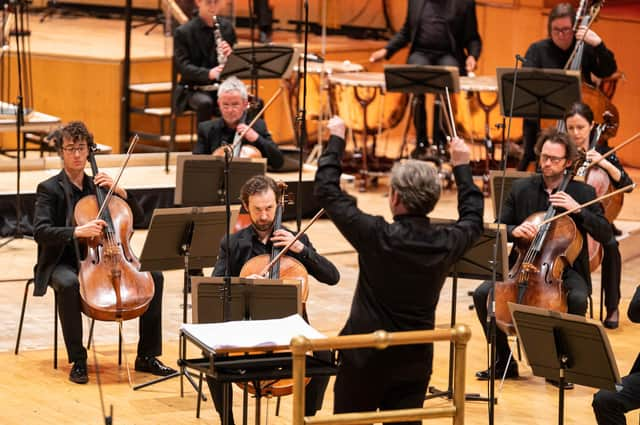Music review: The RSNO play Clydebank '41


RSNO: Clydebank ’41 ****
Eighty years ago, on the 13 and 14 March 1941, the German Luftwaffe unleashed a devastating bombing raid on Clydebank. It left over 1,000 dead or seriously injured, countless families traumatised and homes destroyed, yet within two weeks industrial output in the strategic town had returned to its pre-raid capacity.
It was always on the RSNO’s mind to mark the event within its current Polska Scotland music series (a key factor in saving the John Brown Shipyard was the impromptu defensive action of the Polish destroyer ORP Piorun, fortuitously in Clydebank for repairs), and with a new work commissioned through its Scotch Snaps series.
Advertisement
Hide AdAdvertisement
Hide AdThese objectives aligned with help from West Dunbartonshire Council, who commissioned RSNO principal horn Christopher Gough to write Clydebank ’41, premiered on Sunday on the RSNO YouTube channel with conductor Jonathan Bloxham.
A black-and-white documentary, written and directed by Tony McKee, sets the scene. Survivor reminiscences reinforce the horrifying reality of the aftermath. Gough’s music emerges, initially as a drum roll, fanfare and pastiche wartime newsreel, its valiant crescendo giving way to a pre-recorded Rule Britannia. A switch to full colour signals the performance segment of the work, two movements contrasting in mood and message, but linked by the thematic, often ghostly, presence of the folk song On the Banks of the Clyde.
The Steady Grind of Wartime Life is harsh and gritty, the sounds of wailing sirens a preface to the grim austerity that seems to throw together industrialised Shostakovich with macabre distortions reminiscent of Charles Ives. Desolation is more beautiful, more reflective. Gough’s deft colourings and crafted melody – he inverts the folk tune to striking effect – introduce a rosier optimism, tempered by the scrolling list of Clydebank victims, some as young as “0”. A live performance is planned for November.
To watch the RSNO’s performance of Clydebank ‘41 on their YouTube channel, visit https://www.youtube.com/watch?v=STr1zliUfQY
A message from the Editor
Thank you for reading this article. We're more reliant on your support than ever as the shift in consumer habits brought about by coronavirus impacts our advertisers.
If you haven't already, please consider supporting our trusted, fact-checked journalism by taking out a digital subscription at https://www.scotsman.com/subscriptions